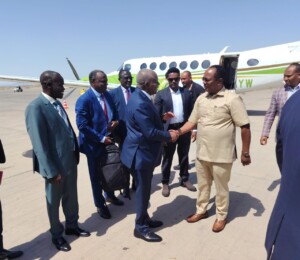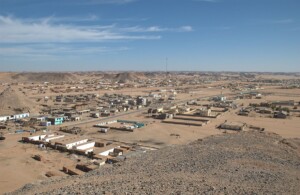More violent protests in Darfur
Darfur witnessed more unrests as protests turned violent in the city of Ed Daein, East Darfur, yesterday. A 10-year-old child was killed by stray bullets during clashes between student protesters and the security forces. In North Darfur, authorities attempt to restore calm after violent events took place earlier this week.
 A protest in Ed Daein last year against the state's governor (RD)
A protest in Ed Daein last year against the state's governor (RD)
Darfur witnessed more unrests as protests turned violent in the city of Ed Daein, East Darfur, yesterday. A 10-year-old child was killed by stray bullets during clashes between student protesters and the security forces. In North Darfur, authorities attempt to restore calm after violent events took place earlier this week.
Witnesses told Radio Dabanga that the protesters looted several shops south-east of the Grand Market and near the railway. They also said that protesters burned several vehicles and buildings belonging to state radio and television channels and the Ministry of Finance.
The director of the state radio and television channels said that their studios, broadcast rooms, computers, LCD screens, and three vehicles were damaged.
Security forces fired tear gas and bullets, wounding a number of protestors.
The state government announced a 48-hour curfew and the suspension of work in government institutions by means of emergency legislation.
Abdallah Ishag Mohamed, an advisor to the governor of East Darfur, said that dozens of people had been arrested in possession of stolen goods.
Protests have taken place across Sudan in relation to the increased living costs, in particular against the high rise in bread and fuel prices. On Tuesday, shops were looted by protesters in Nyala, the capital of South Darfur.
The Sudan Liberation Movement led by Minni Minawi (SLM-MM) accused the government of failing to carry out its duties to prevent the theft and looting that took place across various cities.
Minawi said that the demonstrations denouncing the high prices, the lack of services, and the scarcity of basic goods are understandable and acceptable. However, he added that the theft, looting, and burning of buildings opened up many questions.
North Darfur violence
The wali (governor) of North Darfur, Mohamed Arabi, has held employees from the former regime responsible for planning the violent events that took place in El Fasher on Monday. The violence followed the arrest of the herders who were accused of killing a farmer.
The farmer, Mahdi Matar Idris, was stabbed to death by herders on his farm in the Arafana area, east of El Fasher on Saturday.
Eyewitnesses told Radio Dabanga that civilians carried firearms and sticks through the city’s market on Monday to protest the arrest of the herders. The events resulted in the destruction of government institutions and property. At least six government institutions were burned and destroyed.
During a press conference, wali Arabi said that supporters of the former regime took advantage of the commotion after the killing of a farmer. He described the events in El Fasher as a deliberate attempt to provoke a violent reaction from the authorities.
The wali threatened to arrest those he described as ‘major saboteurs’ and directed the regular forces to use force against those participating in acts of violence, looting, and sabotage.
The decision also granted regular forces the authority to make arrests and government institutions two days of leave.
The wali told the police to open any road that had been closed off but said that the state government decided to close three markets in El Fasher and suspend studies due to fears of further violence.
He also said that the authorities formed a committee to investigate the events.
The governor stressed that the violent events were not unique to North Darfur and compared it to the violence in Ed Daein, Nyala, El Obeid, and other places.
He further explained that the supporters of the former regime are focusing on the localities of Kabkabiya, Kutum, and Mellit.
Darfur has a long history of strife between often Arab herding tribes and non-Arab African herders or sedentary farmers, which were exploited by the previous regime of dictator Omar Al Bashir who supported the Janjaweed militia that carried out many attacks on farmers.











 and then
and then